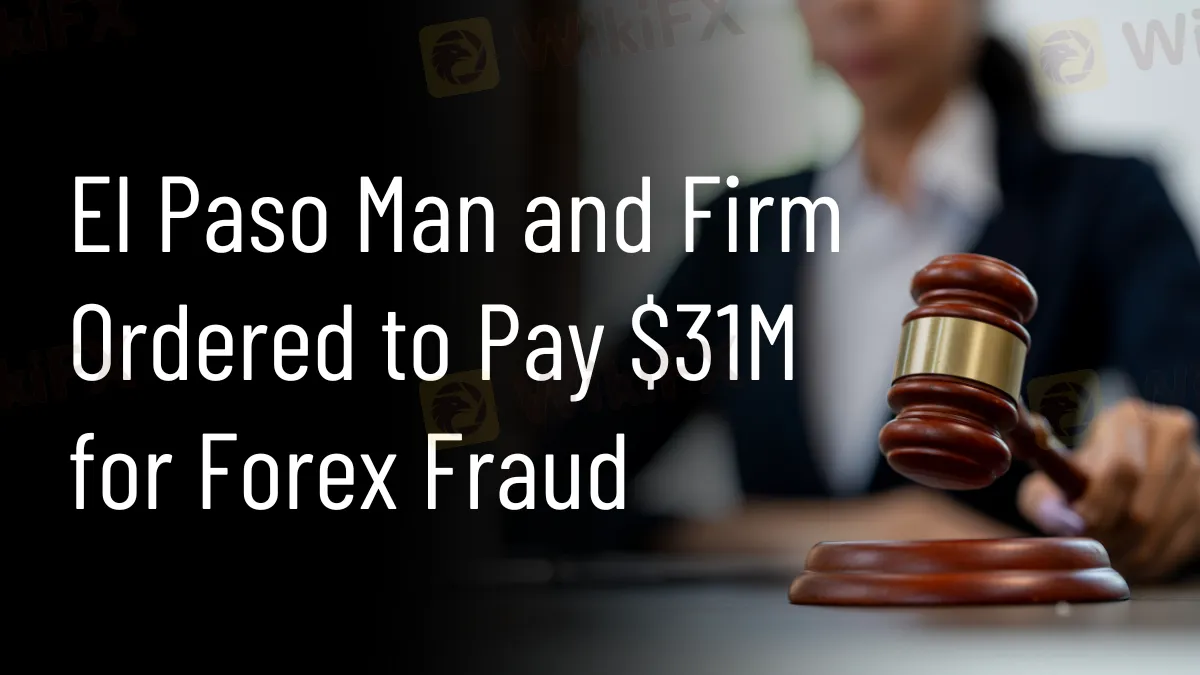简体中文
繁體中文
English
Pусский
日本語
ภาษาไทย
Tiếng Việt
Bahasa Indonesia
Español
हिन्दी
Filippiiniläinen
Français
Deutsch
Português
Türkçe
한국어
العربية
El Paso Man and Firm Ordered to Pay $31M for Forex Fraud
Abstract:Abner Alejandro Tinoco and Kikit & Mess Investments, LLC ordered to pay over $31 million for forex fraud. Discover the details of this landmark case.

Washington, D.C. The Commodity Futures Trading Commission (CFTC) announced that Senior Judge David C. Guaderrama of the United States District Court for the Western District of Texas had ordered significant monetary penalties against Abner Alejandro Tinoco and his firm, Kikit & Mess Investments, LLC, totalling more than $31 million. This verdict, delivered on July 9, seeks compensation for victims of their fraudulent operations.
According to the court ruling, Tinoco and Kikit & Mess, formerly operated in El Paso, Texas, must pay $6,203,792.18 to compensate 199 misled victims. They must also pay a disgorgement of $6,257,904.89, with any restitution payments being credited dollar for dollar. In addition to these sums, they face a civil monetary penalty of $18,773,714, three times the illegal profits from their deceptive foreign currency (FX) and cryptocurrency scam.
Previously, on March 25, 2022, the court granted an initial consent order for a permanent injunction against Tinoco and Kikit and Mess. This injunction prevents them from violating CEA and CFTC laws in the future. Furthermore, they are prohibited from trading in any CFTC-regulated markets or registering with the agency.
The first consent order also indicated that the defendants engaged in fraudulent acts beginning in September 2020. They took over $7.2 million in investment monies from customers and distributed bogus “investment profits” to other clients in a Ponzi scheme-like manner.
Tinoco utilized the monies for personal needs, such as chartering a private plane, buying a luxury residence and other real estate, and obtaining or leasing expensive automobiles rather than investing them as promised.
These decisions address and resolve the CFTC's enforcement action against Tinoco and Kikit & Mess, which began on September 28, 2021.

On November 29, 2022, the Department of Justice accused Tinoco in the Western District of Texas of five counts of wire fraud based on the same fraudulent activity described in the CFTC's complaint. Tinoco pled guilty to these crimes on February 29, 2024, and was sentenced to 84 months in prison, followed by three years of supervised release. He was also sentenced to pay $9,023,695.77 in reparation to the victims. Tinoco is spending his term at the Federal Correctional Institution in Safford, Arizona.
The CFTC thanked Kelly Crawford of Scheef & Stone, L.L.P., who acted as the receiver in this instance, for his help.
Susan B. Padove, Heather J. Dasso, Matthew Edelstein, Elizabeth M. Streit, Scott Williamson, Robert Howell, and former CFTC employee David Terrell are all CFTC's Division of Enforcement team members in charge of this matter.
The CFTC's Commodity Pool and Forex Fraud Advisories
The CFTC has released a number of consumer protection Fraud Advisories to assist the public in identifying and avoiding fraudulent schemes. Among them are the Commodity Pool Fraud Advisory and the Forex Fraud Advisory, which emphasize the warning indications of such scams and provide practical advice on how to avoid them.
The CFTC strongly recommends that the public check the registration status of persons or entities with the CFTC before investing any money. Unregistered companies should be treated with care. The NFA BASIC system allows you to check the status of your registration.
Suspicious activity or suspected breaches of commodities trading regulations may be reported to the CFTC's Division of Enforcement via a toll-free hotline at 866-FON-CFTC (866-366-2382), an online tip submission form, or by contacting the Whistleblower Office. Whistleblowers may be entitled to between 10% and 30% of the monetary penalties collected, which are paid from the Customer Protection Fund. This fund is supported by monetary penalties paid to the CFTC by CEA offenders.
Get the latest insights on financial market regulations and enforcement actions. Click here for today's top stories on WikiFX!

Disclaimer:
The views in this article only represent the author's personal views, and do not constitute investment advice on this platform. This platform does not guarantee the accuracy, completeness and timeliness of the information in the article, and will not be liable for any loss caused by the use of or reliance on the information in the article.
Read more

Think Scams Won’t Happen to You? That’s Exactly What Scammers Count On
We live in a world where information is everywhere. People are more digitally literate than ever before. Financial education is just a few clicks away. And yet, investment scams are not going away but they’re getting worse. It’s tempting to think that only the gullible fall for these tricks. But that’s far from the truth. Why? Because investment scams don’t target your knowledge. They target your emotions.

Why Trade Agreements Matter to Nations
In today’s interconnected world, trade agreements serve as the foundation for stable and predictable international commerce.

Trade Fights Are Heating Up—What Happens Next?
Global financial markets have become increasingly reactive to even minor developments in international trade talks.

Juno Markets Upgrades to FYNXT PAMM
Juno Markets has successfully upgraded its managed account infrastructure by integrating FYNXT’s Percent Allocation Management Module (PAMM) system.
WikiFX Broker
Latest News
"Rate & Reward: Broker Review Contest"
FSRA Sanctions Hayvn Group and CEO for Regulatory Breaches and Misleading Conduct
2024 AI Ad-Blocking Performance Revealed
Why Are More Regulated Brokers Providing Free VPS Services?
SkyLine Guide 2025 Thailand Officially Launched: Judging Panel Formation Underway
Five UK Financial Firms Collapse, FSCS Offers Support for Affected Clients
Why Trade Agreements Matter to Nations
Non-Existent Online Scheme Took Away RM580,000
RM15 Million Gone in Fake Investment Scam
Think Scams Won’t Happen to You? That’s Exactly What Scammers Count On
Currency Calculator


